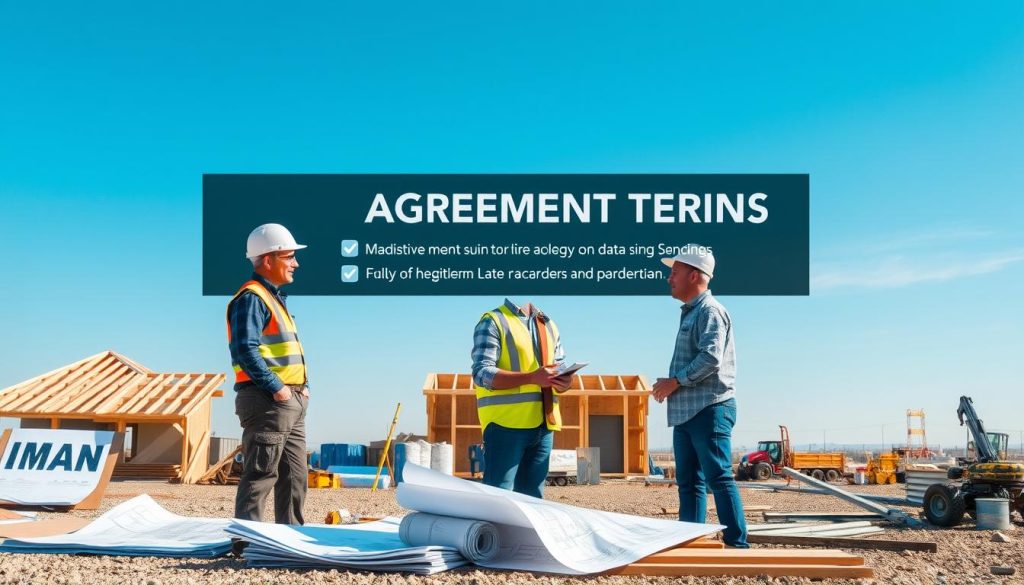In 2022, disputes in the USA were worth around $42.8 million on average. They usually lasted about 13.6 months. For those in construction, avoiding client disputes is critical. It helps keep good relationships and a strong reputation. Often, disputes come from not understanding each other, expecting too much, or not enough paperwork. These issues can hurt both your project and money.
To lower the chance of disputes, we should talk clearly, make contracts clear, and keep good records. This piece will discuss ways to prevent contractor disputes. We’ll look at why disputes happen and steps contractors can take to lower risks. For tips on effective project planning, see this bathroom remodel planning guide.
Key Takeaways
- Knowing why disputes happen helps avoid them.
- Good communication helps prevent misunderstandings.
- Having realistic timelines and budgets is important.
- Clear contracts outline work to avoid issues later.
- Keeping track of progress and talks helps manage projects well.
- Building trust with clients can lower the chance of disagreements.
- Dealing with risks early leads to smoother operations.
Understanding Common Causes of Disputes
Finding out why clients argue is key for contractors who want to keep good ties. Often, disputes start with miscommunication in construction. This happens when project details and expectations aren’t clear to all. Not seeing eye to eye can cause problems and even stop a project.
Miscommunication and Misunderstandings
Good talking is essential to stop disputes. When teams talk openly, they create a good space to fix issues fast. This way, they spot problems early, from small mix-ups to big arguments.
Scope Creep and Unclarified Changes
Scope creep happens when project plans grow without a formal okay. This change makes the original plan complex and leads to big disagreements. To stop scope creep, it’s crucial to be clear about changes and get them approved.
Budget Overruns and Financial Misalignments
Going over the budget is a big issue in contracting. Clients sometimes don’t get how much things will cost at first. Being clear about money and possible extra costs can ease the worry of going over budget.
Importance of Clear Contracts
Clear contracts are key for a good contractor-client relationship in construction. They set out what both sides expect and must do. This helps avoid disagreements and makes sure everyone works well together.
Key Elements Every Contract Should Include
Every contract needs these important parts:
- Project Scope: Make it clear what work will be done.
- Timelines: Have clear deadlines for important parts of the project.
- Payment Schedules: Explain how and when payments will happen.
- Responsibilities: Say what contractors and clients need to do.
If these areas aren’t clear, it can lead to issues that might cost a lot to fix.
The Role of Legal Guidance
It’s crucial for contractors to get legal advice when making contracts. Lawyers make sure contracts follow the law and meet your goals. They can also suggest ways to solve disputes without going to court, saving time and money.
Defining Terms and Expectations
Being clear about what terms mean is important to avoid confusion. Clear definitions and detailed responsibilities mean everyone understands each other. This keeps things professional. Regularly checking contracts keeps them up to date, helping avoid problems later.
Effective Communication Strategies
In the construction world, strong communication is key. It helps keep contractor-client relationships solid. These methods prevent misunderstandings, grow trust, and boost teamwork. This leads to smoother projects.
Maintaining Regular Updates
Regular updates are crucial. They keep clients in the loop about what’s happening and any issues. This shows commitment and builds trust. Effective communication, like scheduled meetings and updates, keeps everyone on the same page. It helps solve problems quickly.
Utilizing Project Management Tools
Project management tools improve transparency. They let contractors and clients see project progress and resources. Also, these tools help keep track of decisions. This reduces the chances of disagreements.
Active Listening and Client Engagement
Active listening is essential for connecting with clients. It ensures contractors understand what clients want and need. This means asking questions and empathizing with clients. Practices like these improve relationships and reduce conflicts before they worsen.
Setting Realistic Expectations
Setting realistic expectations is key for any construction project’s success. Knowing project timelines, resource availability, and possible risks helps build strong client relationships. By addressing these factors, we can reduce disputes and work together better.
Project Timeline Management
Managing a project’s timeline starts with clear communication. Contractors who share schedules and plan for delays keep everyone on the same page. It’s shown that weekly progress updates can cut the chances of disputes by 60%. These regular updates boost trust and address issues early.
Resource Availability and Limitations
It’s important to talk about what resources are available at the project’s start. Clients need to understand what is possible with the given resources. Contractors who offer clear written estimates, and update them if things change, are seen as more credible and meet client expectations better.
Addressing Potential Risks Early
Discussing potential risks at the beginning prevents future surprises. Contractors can make plans to handle these risks. This not only solves problems but also improves the project. Being proactive like this increases client trust and makes for a smoother project.
Documenting Everything
In the construction world, keeping detailed records is key. It helps everything run smoothly and reduces arguments. Writing things down means everyone knows what has been agreed on. This builds trust between everyone involved.
The Value of Written Records
Having things in writing makes everyone accountable. It creates a clear record that can be looked back on. This is especially important for contracts and helps solve any disagreements. Good documentation also protects against losses by making sure everyone knows their duties.
Keeping Track of Changes and Approvals
Project plans often need changes. Keeping a record of these changes helps avoid confusion. Writing down why things were changed keeps the project moving smoothly. It also keeps everyone on the same page, stopping misunderstandings from getting in the way of teamwork.
Regularly Updating Contracts as Needed
It’s important for contracts to keep up with the project. Updating contracts shows any new plans, deadlines, or goals. This keeps everyone clear on their roles and helps prevent arguments. Keeping contracts current helps the project succeed and keeps relationships strong.
| Documentation Practices | Benefits |
|---|---|
| Maintaining Detailed Records | Provides evidence and supports accountability |
| Tracking Changes | Ensures all parties are informed and aligned |
| Updating Contracts Regularly | Minimizes misunderstandings and misinterpretations |
| Documenting Communication | Creates a transparent project atmosphere |
Building Strong Client Relationships
Building strong client relationships is key in construction. We know how vital client trust is. It’s the base of successful work together. By earning trust, we make clients feel important and understood.
Establishing Trust and Rapport
Building trust means we always talk clearly and truthfully. Having just one person to talk to makes communication simpler. It avoids mix-ups. Giving regular project updates, including issues, keeps clients in the loop. A whopping 96% of clients say being honest is key for lasting work relationships.
The Importance of Client Feedback
We love hearing from clients. Their feedback helps us get better. By understanding their needs, we can ensure they’re happy with the project. Suggesting new ideas helps keep everyone involved. This shows clients we value their trust.
Strategies for Conflict Resolution
Having clear plans for solving conflicts is important. We see conflicts as chances to do better. Being open about how changes affect cost and time builds trust. Our contracts are clear on who does what, costs, and solving disputes. This cuts down disputes by 82%. It’s essential for lasting partnerships.

Handling Disputes When They Arise
In the construction world, solving client problems quickly is key. When issues come up, the first steps matter a lot. Talking openly with clients can clear up confusion and set the stage for fixing the problem.
Being proactive helps prevent issues from getting bigger. It also builds trust.
Initial Steps to Take
If talking it out doesn’t work, bringing in a third party for help may be needed. This can provide a fair view that helps everyone agree. It’s a good step before going into more formal steps like arbitration, which is usually needed before going to court.
We focus on talking clearly with clients to avoid problems. This is key for smoother project work.
Involving Third Parties for Mediation
It’s important to learn from past problems to get better. By looking at why conflicts happen, like unclear contracts or delays, we can get better. We can make terms clearer and hold everyone accountable.
Only by looking back can we keep our promise of good work and making customers happy in the future.
Learning from Disputes for Future Projects
FAQ
What are the most common causes of client disputes in construction?
Disputes often start with miscommunication and misunderstandings. Unclarified changes can cause scope creep. Budget overruns often lead to financial misalignments. Tackling these issues early can prevent conflicts.
How can clear contracts help prevent disputes?
Clear contracts are vital for successful projects. They layout all important details, such as project scope, deadlines, and payments. Both parties understanding these can reduce disputes.
What effective communication strategies can contractors use to prevent conflicts?
To avoid conflicts, contractors should keep clients updated regularly. They should use project management tools for clarity. Listening to clients helps understand their needs and avoid conflicts.
What should be included in a construction project timeline?
A project timeline must detail every phase, including milestones and deadlines. It should also allow for possible delays. This sets clear expectations and prepares everyone for changes.
Why is documenting everything crucial in construction projects?
Keeping written records is key. They prove what was agreed, decided, and changed. This avoids misunderstandings and helps both sides if disputes occur.
How can building strong client relationships minimize disputes?
Building trust and rapport with clients opens up communication. It makes clients feel important. Encouraging feedback helps contractors meet expectations and improve satisfaction.
What steps should contractors take when a dispute arises?
If a dispute happens, tackle it quickly. Talk openly with the client and understand their view. If needed, bringing in mediators can help find a peaceful solution.
How can contractors learn from past disputes?
Learning from disputes means looking at what went wrong. Find what needs improvement. Reflecting on these leads to better practices and outcomes in future projects.
Source Links
- https://www.cotneycl.com/5-ways-to-avoid-construction-disputes/
- https://www.planradar.com/us/construction-litigation-and-disputes/
- https://www.levelset.com/blog/avoid-construction-disputes/
- https://www.long-intl.com/articles/why-construction-disputes-occur/
- https://gocodes.com/construction-disputes-causes/?srsltid=AfmBOopCWP7NS6n3FRk-CS9tWGrBvQZuqUBaFB2MplN9P47woHham2z9
- https://www.conradscherer.com/resources/preventing-business-disputes-through-clear-contracts/
- https://www.superlegal.ai/blog/how-to-avoid-contract-disputes-and-protect-your-business/
- https://www.lexology.com/library/detail.aspx?g=1acd609a-ed42-466e-aa61-66bf94cfc075
- https://blog.magicplan.app/dealing-with-difficult-clients-in-residential-construction-projects
- https://www.method.me/blog/avoid-construction-client-miscommunications/
- https://resources.greenskycredit.com/home-improvement-blog/avoiding-conflicts-by-setting-expectations
- https://pollackpeacebuilding.com/blog/construction-dispute-resolution/
- https://buildbook.co/blog/client-management-construction
- https://shermlaw.com/articles-by-ssjh-attorneys/preventing-disputes-in-construction-tips-for-builders-and-contractors/
- https://busybusy.com/guides/how-to-manage-construction-contract-disputes/
- https://www.linkedin.com/pulse/avoiding-conflict-construction-scott-coulton-av7de
- https://www.constructconnect.com/blog/3-keys-to-building-strong-general-contractor-client-relationships
- https://www.tradifyhq.com/blog/building-a-strong-client-contractor-relationship
- https://mici.com/how-to-handle-and-avoid-construction-contract-disputes/
- https://neuroject.com/construction-disputes/
- https://www.viewpoint.com/blog/litigation-and-disputes-in-construction


